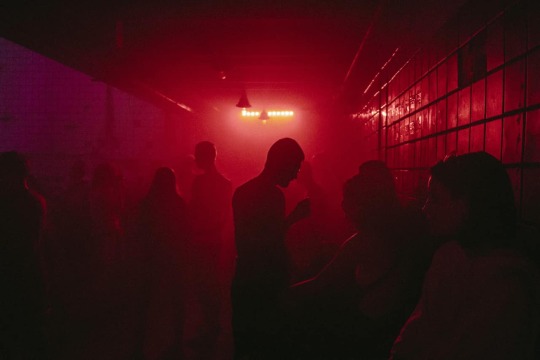Photo


Coco Fusco, Your Eyes Will Be an Empty Word, 2021, HD video, color, sound, 12 minutes. From the Whitney Biennial 2022: “Quiet as It’s Kept.
209 notes
·
View notes
Photo

Trevor Paglen, “‘Fanon’ (Even the Dead Are Not Safe) Eigenface” (2017), dye sublimation metal print
1 note
·
View note
Photo

Trevor Paglen, “Bahamas Internet Cable System (BICS-1), NSA/GCHQ-Tapped Undersea Cable, Atlantic Ocean” (2015), c-print, 60 x 48 inches (image) (courtesy the artist and Metro Pictures)
0 notes
Photo

ORLAN is a contemporary French artist known for the radical act of changing her appearance with plastic surgery in the name of art. Similar to the self-portraits of Cindy Sherman, ORLAN uses her face and body as malleable tools for shifting identities. “I have been the first artist to use aesthetic surgery in another context—not to appear younger or better according to the designated pattern. I wanted to disrupt the standards of beauty,” she explained.
“Beauty is becoming less about luck and more about choice.”
Portrait of the French artist and performer Orlan, taken by photographer Fabrice Lévêque in 1997.
BRON
3 notes
·
View notes
Photo

“Untitled” (Portrait of Ross in L.A.) is a 1991 piece by Felix Gonzalez-Torres in the collection of the Art Institute of Chicago. It’s a spilled pile of candy.
“Untitled” (Portrait of Ross in L.A.) represents a specific body, that of Ross Laycock, Gonzalez-Torres’ partner who died of AIDS in 1991. This piece of art serves as an “allegorical portrait,” of Laycock’s life.
The pile of candy consists of commercially available, shiny wrapped confections. The physical form of the work changes depending on the way it is installed. The work ideally weighs 175 pounds (79 kg) at installation, which is the weight of Ross Laycock when healthy.
Visitors are invited to take a piece of candy from the work. Gonzalez-Torres grew up Roman Catholic and taking a candy is a symbolic act of communion, but instead of taking a piece of Christ, the participant partakes of the “sweetness” of Ross. As the patrons take candy, they are participants in the art. Each piece of candy consumed is like the illness that ate away at Ross’s body.
Multiple art museums around the world have installed this piece.

Per Gonzalez-Torres’ parameters, it is up to the museum how often the pile is restocked, or whether it is restocked at all. Whether, instead, it is permitted to deplete to nothing. If the pile is replenished, it is metaphorically granting perpetual life to Ross.

In 1991, public funding of the arts and public funding for AIDS research were both hot issues. HIV-positive male artists were being targeted for censorship. Part of the logic of “Untitled” (Portrait of Ross in L.A.) is you can’t censor free candy without looking ridiculous, and the ease of replicability of the piece in other museums makes it virtually indestructible.

65K notes
·
View notes
Text
nobody talk to me i'm thinking about portrait of ross in la

58 notes
·
View notes
Text


Félix González-Torres, Untitled (Portrait of Ross in L.A.), 1991.
43 notes
·
View notes
Photo

ORLAN is a contemporary French artist known for the radical act of changing her appearance with plastic surgery in the name of art. Similar to the self-portraits of Cindy Sherman, ORLAN uses her face and body as malleable tools for shifting identities. “I have been the first artist to use aesthetic surgery in another context—not to appear younger or better according to the designated pattern. I wanted to disrupt the standards of beauty,” she explained.
“Beauty is becoming less about luck and more about choice.”
Portrait of the French artist and performer Orlan, taken by photographer Fabrice Lévêque in 1997.
BRON
3 notes
·
View notes
Photo

“Untitled” (Portrait of Ross in L.A.) is a 1991 piece by Felix Gonzalez-Torres in the collection of the Art Institute of Chicago. It’s a spilled pile of candy.
“Untitled” (Portrait of Ross in L.A.) represents a specific body, that of Ross Laycock, Gonzalez-Torres’ partner who died of AIDS in 1991. This piece of art serves as an “allegorical portrait,” of Laycock’s life.
The pile of candy consists of commercially available, shiny wrapped confections. The physical form of the work changes depending on the way it is installed. The work ideally weighs 175 pounds (79 kg) at installation, which is the weight of Ross Laycock when healthy.
Visitors are invited to take a piece of candy from the work. Gonzalez-Torres grew up Roman Catholic and taking a candy is a symbolic act of communion, but instead of taking a piece of Christ, the participant partakes of the “sweetness” of Ross. As the patrons take candy, they are participants in the art. Each piece of candy consumed is like the illness that ate away at Ross’s body.
Multiple art museums around the world have installed this piece.

Per Gonzalez-Torres’ parameters, it is up to the museum how often the pile is restocked, or whether it is restocked at all. Whether, instead, it is permitted to deplete to nothing. If the pile is replenished, it is metaphorically granting perpetual life to Ross.

In 1991, public funding of the arts and public funding for AIDS research were both hot issues. HIV-positive male artists were being targeted for censorship. Part of the logic of “Untitled” (Portrait of Ross in L.A.) is you can’t censor free candy without looking ridiculous, and the ease of replicability of the piece in other museums makes it virtually indestructible.

65K notes
·
View notes
Text
nobody talk to me i'm thinking about portrait of ross in la

58 notes
·
View notes
Text


Félix González-Torres, Untitled (Portrait of Ross in L.A.), 1991.
43 notes
·
View notes
Text

The Miller House by Eero Saarinen (interior collaboration with Alexander Girad and Charles Eames), Columbus, Indiana, 1957
6K notes
·
View notes
Photo

Aydin Aghdashloo — The Years of Fire and Snow (from the series Memories of Destruction) [gouache on board, 1978]
310 notes
·
View notes
Text


“Love is a sacrament that should be taken kneeling”
—Oscar Wilde
173K notes
·
View notes






